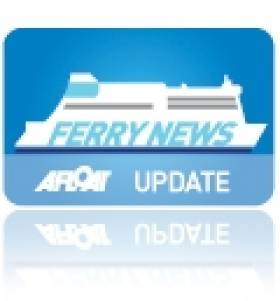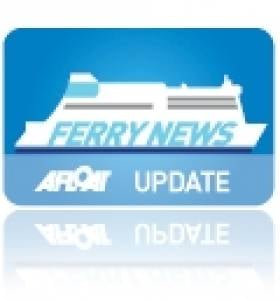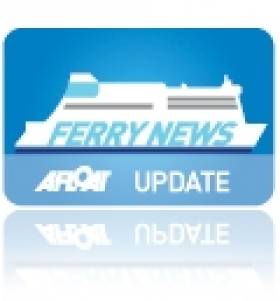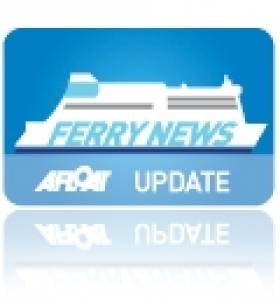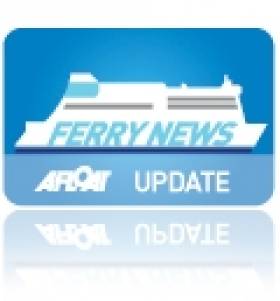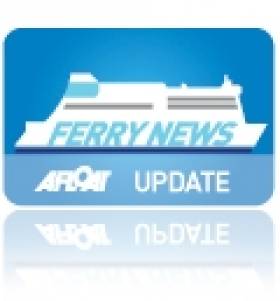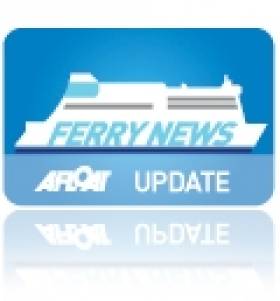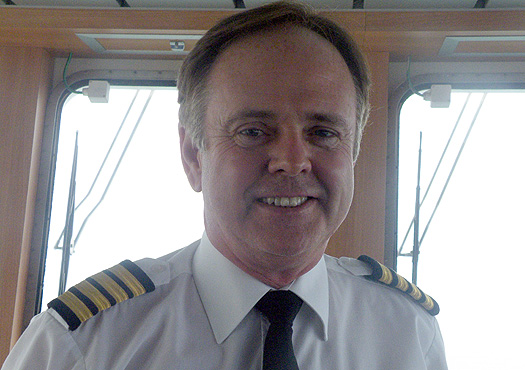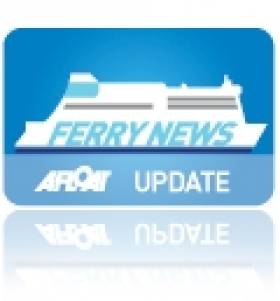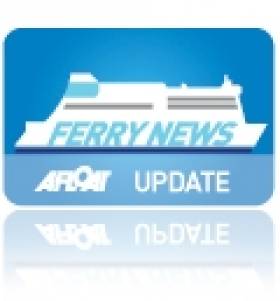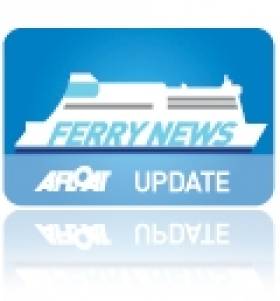Displaying items by tag: Irish Ferries
Travel Trade Award ‘Best Ferry Company’ to Irish Ferries
#FerryAward – At the Irish Travel Trade Awards, now in its 23rd year, Irish Ferries was voted 'Ireland's Best Ferry Company 2014' during a ceremony held last week.
The award category saw the ferry company winning in the face of competition from operators not just on Ireland – UK routes but those also serving on Ireland – France services.
Organised and sponsored by the Irish Travel Trade News magazine, the ITTN awards saw the ferry operator win the acclaimed award for the eighth year in succession and the 17th time overall. Each of the award categories are based on independent votes of travel trade professionals working in agencies throughout the island of Ireland.
The ferry award is said to have reflected the travel industry's response to the continuing investment being made by Irish Ferries.
In the past year, this has been seen particularly in the introduction of the passenger and freight ferry or 'ro-pax', Epsilon which has boosted capacity on the Dublin – Holyhead route and a new once-weekly return service on the new Dublin – Cherbourg route.
Winter Overhauls Outlined for Irish Ferries Fleet
#Overhauls - Winter overhauls of the majority of Irish Ferries fleet in early 2015 are understood to be heading to Birkenhead at Cammell Laird shipbuilder and repairs, writes Jehan Ashmore.
Ulysses has been scheduled to go first for annual maintenance with the overhaul starting on 6 January, following the 02.40hrs sailing from Holyhead.
On completion of her overhaul, her Dublin-Holyhead running mates, fast-ferry Jonathan Swift and Isle of Inishmore are scheduled to visit the dry-dock facility on Merseyside.
So far the yard for Oscar Wilde's overhaul is unknown, though a time for her dry-docking has been scheduled for early February.
Last year she was the odd one out as unlike her fleetmates which visited Birkenhead she instead went to A&P Falmouth.
Christmas Boost to Irish Ferries Sailing Schedule
#ChristmasSailings– A boost to sailing capacity over Christmas on Irish Ferries Dublin-Holyhead service as previously reported will see cruiseferry Isle of Inishmore transferred to the route on Saturday 20 December, departing the capital with the 08.00hrs sailing, writes Jehan Ashmore.
Isle of Inishmore will add additional sailings by joining the route's regular ships, flagship Ulysses, fast-ferry Jonathan Swift and ro-pax Epsilon which also operates on the Welsh route. The ro-pax also makes a French connection on the Dublin-Cherbourg route by running at weekends on the year-round operated service.
In place of Isle of Inishmore which usually serves Rosslare-Pembroke Dock sailings, her fleetmate also running from the Wexford 'Europort' will be that of continental cruiseferry Oscar Wilde. Her switch to the Pembrokeshire route will see her stand down from this year's sailings on the route to Cherbourg.
Oscar Wilde is to enter the south Wales route by taking the 20.45hrs sailing departing Rosslare on Friday 19 December.
For more information on sailing times, visit: www.irishferries.com
Epsilon’s Entry Contributes Positive Results for Irish Ferries
#EpsilonEconomics – Irish Ferries introduction of ro-pax Epsilon almost a year ago has led to a rise in overall fuel costs as previously reported on Afloat.ie, however in general she has been financially rewarding, writes Jehan Ashmore.
According to Ships Monthly, the chartered Italian-flagged ro-pax has contributed to a positive recovery in Irish Ferries core ro-ro and car markets as indicated for results for the first half of the 2014-15 financial year, to 23 August. There has been a 20% rise in the ro-ro freight sector and 8% was achieved in passenger cars.
Epsilon's ro-pax design enables a large freight capacity to be handled while still carrying passengers. The 26,375 tonnes vessel was launched in 20011 from the yard of Visentini, a shipyard close to Venice. She offers an economy service and limited facilities.
The ro-pax was first pressed into Irish Sea service providing additional capacity on the Dublin-Holyhead route during weekdays.
In addition to Welsh route duties, she launched in January this year a new direct Ireland-France service where at weekends she makes a round trip to the continent linking the Irish capital and Cherbourg in Normandy.
To read more about Epsilon's two-route role click the following link of Afloat.ie interview with her master and accompanying photographs including the ferry during a passage on the Dublin-Cherbourg route.
In another interview published in Ships Monthly (January 2015) the Epsilon is depicted in a photo of the ro-pax following an overnight sailing from Dublin when arriving within the harbour of Cherbourg.
Irish Ferries to Boost Capacity for Christmas
#CapacityBoost - Irish Ferries have announced that they are to transfer Isle of Inishmore from the southern Irish Sea to the Holyhead-Dublin route to ensure there is plenty of capacity to and from Ireland this Christmas.
Afloat.ie adds that this will be the second successive festive season that the Pembrokeshire port serving ferry is to be repositioned onto the busy core central Irish Sea route between Wales and the Irish capital.
"Up to six million people living in Britain have Irish grandparents or even closer connections, so it's no wonder that Christmas is our busiest time of year," says the carrier's head of passenger sales Dermot Merrigan.
The operator's flagship Ulysses at 50,938 tonnes the largest ferry on the Irish Sea, operates the last sailing from Holyhead to Dublin on Christmas Eve at 14.10hrs.
On the last sailing from Pembroke to Rosslare, the Oscar Wilde's departure at 08.45 is on Wednesday 24 December.
There are no sailings on Christmas Day or Boxing Day, and the first UK-bound ferry is the 08.05 sailing from Dublin on Saturday 27 December, followed by five more sailings during the course of the day.
Revenues Rises 10.3% at ICG to €93.4m in Third Quarter
#ICGresultsQ3- A revenue rise of 10.3% for Irish Continental Group (parent company of Irish Ferries) was achieved in the three months to the end of September, while operating profit increased to €23.8 million on the back of increased passenger numbers.
An interim management statement from the firm showed revenue rose to €93.4 million, while earnings before interest, tax, depreciation and amortisation (ebitda) rose to €28.1 million, compared with €26.9 million in the same quarter in 2013.
Fuel costs in the quarter were €14.3 million, up from €12.7 million during the same period in 2013, due to the additional sailings of the ro-pax Epsilon.
For further details see yesterday's Irish Times report by clicking here.
Ferry Captain Interview: Irish Ferries Ro-Pax Epsilon on the Dublin-Wales Route and France Service
#FerryCaptainInterview – Captain Paul Sellers, master of Irish Ferries chartered ro-pax ferry Epsilon, talks about his seafaring career to Jehan Ashmore, and the vessel which serves the core Dublin-Holyhead route in addition the new direct link to France, between the Irish capital and Cherbourg.
Passengers on the 26,375 tonnes Epsilon have economy style service facilities that include a bar, cafeteria, self-service restaurant, two and four berth cabins and free wi-fi service. In addition the ro-pax has boosted vehicle deck space capacity with approximately 2,860 lane metres.
The 19 hour French route augments the cruiseferry operations of the Oscar Wilde on the Rosslare-Cherbourg route and the seasonal-only service to Roscoff.
Where did you study for your seamanship qualifications and what was the most challenging aspect involved?
I studied at Hull Nautical College for both Pre-Sea and the Second Mates and then with the demise of this fine institution I continued with my Chief Mates and Masters Certificates at South Tyneside College South Shields.
Sections of algebra, particularly differentiation I found at times quite challenging, but fortunately my girlfriend and later my wife Julie was a maths graduate and could help me out with that. Also Meteorology could be an enigma, however one day the penny drop and it all became clear ...'hot air rises'
How long was your deep-sea career and where in the world did this take you?
My deep sea career lasted 18 years and took me to all parts of the world with the exception of main land China and East Africa, the rest of the world was pretty much covered during that period.
Describe your thoughts on having your first command, the name of ship and company?
I was fortunate to be promoted to Master in a ship I was serving as Chief Officer in so I was comfortable with the vessel and those I worked with. The ship was an English Channel ro-pax vessel operated by Norfolk line in the Dover Straits between Dover and Dunkirk, this being the mv Northern Merchant.
She was a fine ship to command being predictable and very manoeuvrable, but still a sharp learning curve when you first start. It was a little strange at first I remember walking down the alleyway and someone called 'Captain' I continued to walk they called again, then I realised they meant me ...I was now the Captain!
Also the second mate asked me to look at something one day which was not working, I asked him what he usually did when this happened before, he said I send for the Captain ...and I thought right I am now expected to know all the answers now.
Captain Paul Sellers
Why did you move from a career working in deep-sea to a short-sea role?
The long trips of between 4/6 months then were not compatible with a good family life , I had luckily secured a position which was 2 months on and off but there was no realistic chance of early promotion so I thought I would try and secure some relief work on Ferries during my leave.
I was offered some work with Stena which lead to further work which I enjoyed and they seemed to like me as the offered me a full time position and I left deep sea for the cut and thrust of the Ferry world.
Can you outline your career path and how this led to your current role as master of Epsilon.
A varied career on different vessel types serving with Blue Star for 14 years from cadet to Chief Officer then 2 years as Chief Officer with Curnow on RMS St .Helena.
Following this 4 years were spent altogether with Stena, the first 2 years were on conventional ships then appointed to the revolutionary first HSS Stena Explorer where I was 1st Officer over 2 very interesting years.
I then went back deep seas for two years with P&O /Princess Cruises as 1st Officer which was great for seeing the world but professionally not too rewarding and hankered back for ferries and was offered a job in Dover with new start operator Norfolk Line initially as Chief Officer and was promoted Master with the year. I have sailed Master ever since with Norfolk Line/Maersk and last 6 years with Irish Ferries.
In November 2013, I was appointed Senior Master of Epsilon and went out to Messina in Sicily to take (as previously reported on Afloat.ie), the delivery voyage of the then mv Cartour Epsilon to Ireland.
The introduction of the ro-pax required a new crew to settle into service over a six week period which proved to be both interesting and challenging in equal measure. This proved to be ultimately a very rewarding experience as we now have a built up a happy crew and a good hardworking ship.
What are the main operational differences on the Epsilon between serving the Irish Sea route and those on the longer run to France?
The weather although can be severe as this last winter has shown the Irish Sea is not as exposed as the long trip to France as once south of the Tuskar Rock you are at the mercy of the weather coming in from the Atlantic. So the weather needs to be watched carefully for our passage through the Celtic sea and rounding Lands End and into the western English Channel.
The vessel is robust and on the whole a very good sea ship but she is not invincible as no vessel is and consideration needs to be given when undertaking certain voyages. This may involve delays so to allow very severe weather systems to pass through and navigate her carefully during these periods when on the French run, which can be many hours on the bridge but this is the nature of the FerryMasters position and goes very much with the territory.
How do you find the performance of the Cantiere Navale Visentini built ro-pax Epsilon in terms of her efficiency and that of passenger accommodation?
These vessels offer the operators a very cost effective platform as there are efficient load carriers with good lane meterage for their size and the fuel running consumption/cost are good. The overall package and costs are therefore attractive and appealing to the operators.
The interiors and features may not be as luxurious as other Cruise Ferries in the market place but they do serve a particular sector which is looking for a more cost effective option. Our feedback from Passengers both Tourist and Commercial Drivers is very positive.
Also there is a good reserve of speed available in this class of vessel to catch up if running late to maintain schedule.
What service speed is required? to meet the Dublin-Holyhead route and that of the weekend round trip service on the Dublin-Cherbourg route?
On the Dublin-Holyhead route this is 21 Knots and on the Dublin-Cherbourg service this is 22 Knots, though we can comfortably do 23 knots and have witnessed the vessel achieve 25 knots so we have a little reserve for bad weather.
In having the responsibility of master, what are the main challenges and also the highpoints?
The Master role is a varied at time difficult but rewarding one. The main challenge is to keep everything and everyone together. The ship must trade but at all times ensure that all regulations met and company requirement are observed, it can be at times a bit of a balancing act.
Rewards are achieving this, particularly when the weather is challenging there are additional stresses and pressures in berthing and un-berthing and maintaining the vessel schedule.
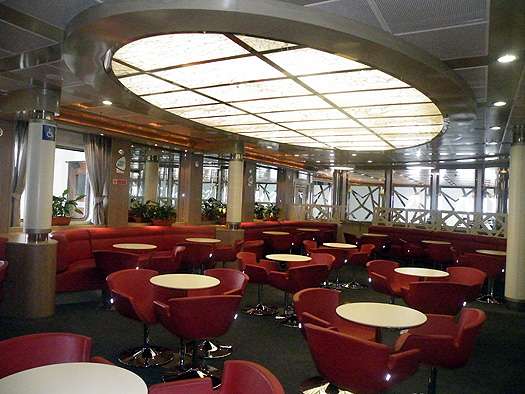
Cafe Lafayette lounge
#FerryNews –CEO of Irish Continental Group has said that Tourism Ireland should take advantage of the "benign" economy in Britain to push for greater numbers of British tourists to visit, writes The Irish Times.
Eamonn Rothwell said he did not wish to criticise Irish tourism authorities but they can be tempted to become "wound up in exotic markets" when Britain should be more of a focus.
Mr Rothwell, a former tourist board employee, said Britain was set to be the fastest growing economy in the OECD this year. This, coupled with Ireland's existing popularity with British tourists, made it "a benign economy in which to say, 'let's go for it'."
He identified the Wild Atlantic Way initiative, whereby Tourism Ireland is promoting visits to the west coast, as positive, but said more was needed. For more click HERE.
#FerryResolved – Irish Ferries ro-pax Epsilon re-entered service today, following technical issues that started on Friday, leading to cancellation of the weekend Dublin-Cherbourg round trip and those to Holyhead, where today's 14.15hrs sailing departed from the capital to Wales, writes Jehan Ashmore.
As previously reported on Afloat.ie, all effected passengers on the central corridor route were accommodated on the ferry company's High Speed Craft, HSC Jonathan Swift in addition to sailings served by flagship cruiseferry, Ulysses.
During her absence on the routes to Anglesey and Normandy, Epsilon had shifted berths from the Dublin Port ferry terminal to the Deepwater Quay facing opposite, and more recently she had occupied a berth within Alexandra Basin, before repairs were resolved.
As previously reported on Afloat.ie, the parent company of Irish Ferries, the Irish Continental Group (ICG) released first quarter financial figures as part of the interim management statement.
In the statement's report, in terms of the ferries division, volumes of Year-to-date (17 May 2014) were as follows and with changes in performance as outlined below within brackets.
Passengers: 441,100 (0%)
Cars: 95,000 (+5%)
RoRo Freight: 87,900 (+18%)
During the period Irish Ferries inaugurated a weekly Dublin-Cherbourg service, operated at weekends by the chartered Epsilon. The Italian flagged Visetini built ro-pax also provides an additional 8 round trips (except Mondays) on the Dublin-Holyhead route.
As a result the contribution of Epsilon operated sailings combined to the overall route network increase by 17%.The other routes are Rosslare-Pembroke Dock, Rosslare-Cherbourg and as recently reported the reopened Rosslare-Roscoff seasonal-only service that began the 2014 season to the Breton port.
The financial results for the last quarter of this year reflected additional costs of operating the Epsilon during the launch phase period on both her sailings serving Holyhead and Cherbourg.
According to Irish Ferries, in the 20 weeks up to last Saturday, they carried 95,000 cars, an increase of 5% on 2013. While car passenger numbers were up, in line with the car volumes, total passenger volumes were in line with the previous year at 441,100 due to a fall in 'foot' passenger carryings.
As regards Roll-on Roll-off (Ro/Ro) freight sector, Irish Ferries carried 87,900 units in this market, an increase of 18% compared with the same period for last year and is a reflected from the introduction of Epsilon's freight capacity and in a growing freight market.
For more information on other sectors of ICG operations, the statement as linked before can also be read in full HERE.
#CancelledSailings – Irish Ferries ro-pax Epsilon sailings on the Dublin route to Wales are cancelled and to France this weekend, the operators are citing technical reasons, writes Jehan Ashmore.
Last night's round trip Dublin-Holyhead sailings were cancelled and throughout today on the Welsh service. Irish Ferries regrets also to advise sailings on this weekend's round trip Dublin-Cherbourg route are cancelled too.
All effected passengers on the Dublin-Holyhead service will be accommodated instead on their High Speed Craft, HSC Jonathan Swift and sailings served by flagship cruiseferry, Ulysses.
For the latest information on sailing schedules, including Irish, UK and French contact telephone lines, visit this Irish Ferries website link.
Epsilon remains berthed in Dublin Port, having shifted berths from the ferryport to an opposite quay and so to free up the linkspan used by other ferries.


























